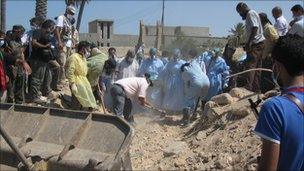Roadside graves found in Tripoli
- Published

The corpses of up to 20 people have been found in two roadside graves on the outskirts of Tripoli.
Forensic experts are investigating the deaths, thought to have occurred last month.
The graves are located just off the 11th June highway, in the Souk al-Jumua area to the east of the capital.
Separately, the charred remains of two bodies were uncovered on airport road in Tripoli.
The corpses were found near the oil tanks of a site known as the Hadba Project, a witness has told the BBC. Local residents in the area said the men were killed on the 22 August.
Libyan rebels captured Tripoli about three weeks ago. Areas of pro-Gaddafi resistance to the rebels remain, notably in Sirte and Bani Walid.
Anti-Gaddafi forces have resumed their attack on Bani Walid, supported by Nato air strikes. Rebel officials says their forces are now within reach of the centre of the town.
The whereabouts of Col Gaddafi and several of his sons remain unknown, though some of his family have fled to Algeria.
Several convoys of former Gaddafi loyalists are also said to have recently streamed over Libya's southern border with Niger.
Grave sites
Local people said there were around 15 bodies buried at one grave site.
They were said to be mostly the remains of African mercenaries who had been fighting for Col Gaddafi.
A few hundred metres away, at a separate site, another four bodies had already been dug up.
Daily, the search goes on for thousands of Libyans still unaccounted for as a result of the conflict, says the BBC's Peter Biles in Tripoli.
But speaking in Tripoli this weekend the head of the National Transitional Council, Mustafa Abdul Jalil, said this was not the time for retribution.
On Saturday, Mr Jalil was greeted by hundreds of cheering, flag-waving supporters when he arrived in the capital for the first time since rebels took over the city.
Until now he had remained in the eastern city of Benghazi. His presence in the capital is aimed at sending a message about his authority.
Correspondents say he now faces big challenges as he tries to stabilise the country and form an effective national administration.